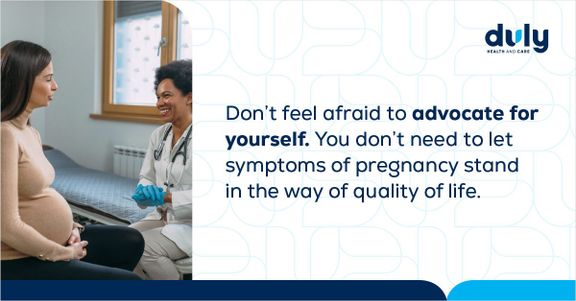Your family and friends keep saying the same thing: You have that “pregnancy glow.” You’re feeling it, too — you can’t wait to bring your newest family member into the world.
But along with the joy and excitement that comes with pregnancy, there are also some things that aren’t quite so enjoyable. From stress to muscle aches to mood swings, being pregnant can take a toll on both your physical and mental health.
Taking time for self-care when you’re pregnant is one of the best ways to keep your health and your baby’s health in check.
Here are 6 ideas for self-care during pregnancy:
1. The Basics: Eat Well, Stay Active, Get Sleep
These are the things you’ve heard many times before: eating a nutritious diet, exercising (in most cases)*, and getting enough sleep are critical during pregnancy when it comes to helping your baby develop and for keeping you both healthy.
But the benefits don’t stop there — diet, physical activity, and sleep are also great ways to practice self-care (whether or not you’re pregnant). A healthy diet along with the right amount of exercise and sleep can lead to:
- Increased energy
- Improved mood
- Lower stress levels
- Reduced symptoms of mental health disorders like anxiety and depression
- Better sleep quality
*Always talk to your provider about exercising while pregnant. There are medical conditions like severe anemia or certain heart and lung diseases that can make certain types of exercise risky during pregnancy.
2. Make a Coming-Home Game Plan
Identifying the things you will need after giving birth — and creating action plans ahead of time — can make those first few weeks at least a little bit less stressful.
When someone says that they will be happy to help out or that they will be there for “anything you need,” don’t take it for granted. Take people up on their offers to babysit or cook you a meal and line up that help before giving birth.
You can also plan for your self-care. For example, if you are set on losing baby weight as quickly (and as safely) as possible, talk to your provider about a diet and exercise plan before your little one arrives.
At the same time, remember that you can’t plan for absolutely everything. Remind yourself that not everything will go as planned, and that that is perfectly okay.
Looking for more ways to take care of yourself during pregnancy? Your OB/GYN at Duly Health and Care is here to help.
3. Don’t Get Overwhelmed by Advice
Along the same lines, it’s great to listen to advice from other moms, whether it’s about staying healthy during pregnancy or how to get through the first few postpartum weeks. But no two moms are the same, and what works for one woman might not work for you. That’s especially true when it comes to things like diet and exercise, so make sure to run advice you get on these subjects by your provider, first.
Advice can be helpful but enter pregnancy and motherhood with an open mindset. If you don’t follow other moms’ advice, don’t let that turn into guilt. Your most important job is to do what’s best for you and your baby.
4. Take Breaks for Yourself
In addition to planning, you are going to doctors’ appointments. You’re still working. You’re managing symptoms like morning sickness. During a time where relaxation is key for your wellness, you may find that you’re busier than ever before.
Sufficient planning and doctors’ appointments are necessary, but make sure that you’re not neglecting your own care. Talk to your partner or your loved ones about taking things off your plate. Don’t be afraid to say no to plans and then take that time to be by yourself. If you spend too much time and energy doing things for other people, or if you’re feeling guilty that you can’t do everything yourself, you may grow to resent the people around you.
5. Get Help for Symptoms
Nausea, vomiting, cramps, muscle aches, extreme fatigue — it’s not uncommon to experience these not-so-pleasant symptoms during pregnancy. But that doesn’t mean you just need to grin and bear it.
Your provider may be able to help you get some much needed relief. For example, they can prescribe medications for severe nausea and vomiting that you can’t relieve on your own.

Don’t feel afraid to advocate for yourself. You don’t need to let symptoms of pregnancy stand in the way of quality of life.
Also, there are some symptoms that you shouldn’t just chalk up to pregnancy, like headaches that won’t go away or extreme swelling in your hands and face (more than the mild swelling that many women experience). You need to take these seriously because they could be signs of potential complications for you or your baby, like preeclampsia or blood clots.
6. Pamper Yourself.
Get your nails done. Let someone put your groceries in your car for you. Take time out for your favorite reality show. Enjoy a prenatal massage (which can also improve newborn health!). Sit on your couch for 10 minutes doing absolutely nothing at all.
Whatever “pampering” means to you, go for it. There will be plenty of time for unwashed hair and only watching cartoons very soon.
It doesn’t matter how you pamper yourself, what advice you seek from other moms, or the type of help you line up for after giving birth. As long as you remember to make time for self-care, you’re taking one more step toward keeping yourself and your baby healthy during pregnancy.
Health Topics:








